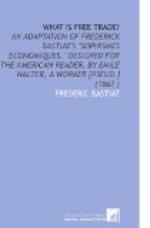Here in New York are a million of human beings who would all die within a few days, if the abundant provisioning of nature were not flowing towards this great metropolis.
Imagination takes fright in the effort to appreciate the immense multiplicity of articles which must cross the Bay, the Hudson, the Harlem, and the East rivers, to-morrow, if the lives of its inhabitants are not to become the prey of famine, riot, and pillage. Yet, as we write, all are sleeping; and their quiet slumbers are not disturbed for a moment by the thought of so frightful a perspective. On the other hand, forty-five States and Territories have worked to-day, without concert, without mutual understanding, to provision New York. How is it that every day brings in what is needed, neither more nor less, to this gigantic market? What is the intelligent and secret power which presides over the astonishing regularity of movements so complicated—a regularity in which each one has a faith so undoubting, though comfort and life are at stake.
This power is an absolute principle, the principle of freedom of operation, the principle of free conduct.
We have faith in that innate light which Providence has placed in the hearts of all men, to which he has confided the preservation and improvement of our race-interest (since we must call it by its name), which is so active, so vigilant, so provident, when its action is free. What would become of you, inhabitants of New York, if a Congressional majority should take a fancy to substitute for this power the combinations of their genius, however superior it may be supposed to be; if they imagined they could submit this prodigious mechanism to its supreme direction, unite all its resources in their own hands, and decide when, where, how, and on what conditions everything should be produced, transported, exchanged, and consumed? Ah! though there may be much suffering within your bounds, though misery, despair, and perhaps hungry exhaustion may cause more tears to flow than your ardent charity can dry, it is probable, it is certain, we dare to affirm, that the arbitrary intervention of government would multiply these sufferings infinitely, and would extend to you all, those evils which at present are confined to a small portion of your number.
We all have faith in this principle where our internal transactions are concerned; why should we not have faith in the same principle applied to our international operations, which are, assuredly, less numerous, less delicate, and less complicated. And if it is not necessary that the Mayor and Common Council of New York should regulate our industries, weigh our change, our profits, and our losses, occupy themselves with the regulation of prices, equalize the conditions of our labor in internal commerce—why is it necessary that the custom-house, proceeding on its fiscal mission, should pretend to exercise protective action upon our exterior commerce?




